In this article:
In addition to mainstream treatments, many home remedies can help relieve some of the symptoms of multiple sclerosis.
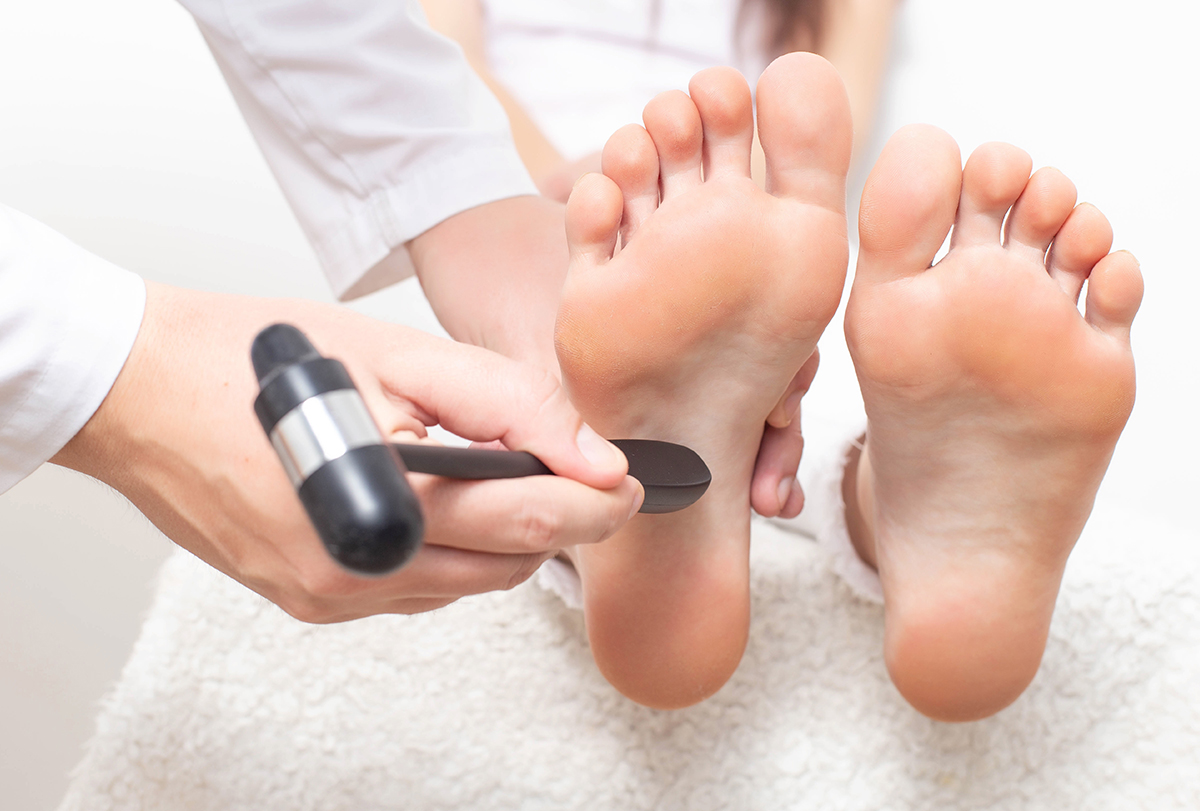
From diet and exercise to supplements and essential oils, read on to learn more about home remedies for multiple sclerosis.
Home Remedies for Multiple Sclerosis
Here are some natural ways to deal with multiple sclerosis.
1. Try the following herbs
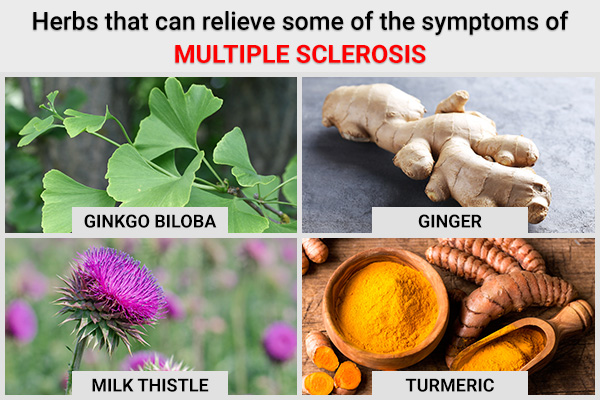
a. Ginkgo biloba
Ginkgo biloba is a popular herbal remedy for many health conditions, including multiple sclerosis. Some people with multiple sclerosis find that Ginkgo biloba can help improve their symptoms. (1)
Ginkgo biloba is thought to work by improving blood circulation and reducing inflammation. (2) It is available in supplement form and can be taken orally or applied topically to the skin.
b. Ginger
One home remedy for multiple sclerosis that you may not have heard of is ginger. That’s right! The same ingredient that gives flavor to your favorite dishes can also be used to treat multiple sclerosis.
Ginger has anti-inflammatory properties that can help to reduce the inflammation associated with multiple sclerosis. It can also help to improve circulation and relieve pain. (3)
To use ginger as a home remedy for multiple sclerosis, you can add it to your diet in various ways. You can grate fresh ginger into your food, drink ginger tea, or take ginger supplements. Start slowly with small amounts of ginger and gradually increase the dosage as tolerated.
c. Milk thistle
Milk thistle is a common home remedy for multiple sclerosis. It is an herb that has been used for centuries to treat various ailments, including liver and kidney diseases.
Milk thistle is rich in antioxidants and anti-inflammatory compounds, which make it a popular natural treatment for multiple sclerosis. Some studies have shown that milk thistle can help reduce the symptoms of multiple sclerosis, including fatigue, muscle weakness, and spasticity. (4)
d. Turmeric
The primary active ingredient of turmeric, curcumin, is anti-inflammatory. (5) It is this compound that is thought to help in pain relief in multiple sclerosis and may also protect the nerves from getting destroyed further. (6)
2. Vitamins and minerals
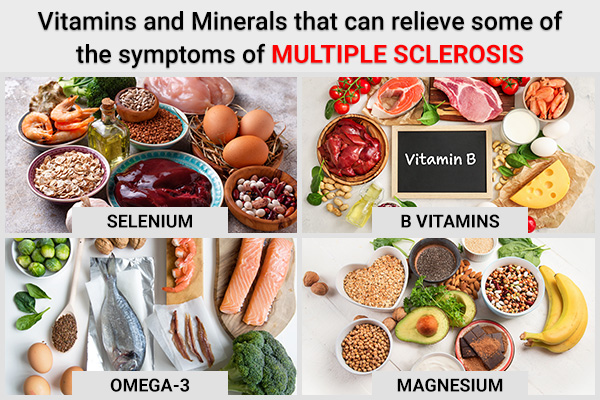
a. Selenium
Selenium is a mineral that is essential for many body processes, including the production of glutathione, which is important as an antioxidant.
Selenium supplements may help to reduce the symptoms of multiple sclerosis, and some studies have found that glutathione deficiency may be a risk factor for developing multiple sclerosis. (7)
b. B vitamins
B vitamins are essential nutrients that play a role in many different functions in the body. B vitamins are water soluble, meaning they are not stored in the body and need to be replenished daily. B vitamins have been shown to be beneficial for people with multiple sclerosis.
There are eight B vitamins: thiamine (B1), riboflavin (B2), niacin (B3), pantothenic acid (B5), pyridoxine (B6), biotin (B7), folic acid (B9), and cobalamin (B12). Each B vitamin has a specific function in the body, but they all work together to support various bodily processes.
Thiamine is involved in energy metabolism, while riboflavin helps with cell growth and repair. Niacin supports the nervous system and helps the body convert food into energy.
Pantothenic acid is necessary for the production of hormones and cholesterol, while pyridoxine aids in the metabolism of amino acids.
Biotin helps maintain healthy skin, hair, and nails, while folic acid is important for pregnant women to help prevent birth defects. Cobalamin is necessary for the formation of red blood cells and DNA.
Most people get enough B vitamins from their diet, but some groups of people may be at risk of deficiency. People with multiple sclerosis may be at risk of deficiencies in certain B vitamins due to their disease.
Since B vitamins are necessary for the proper functioning of the nervous system, it is essential that an adequate intake is maintained. (8)
c. Omega-3
There is no one home remedy for multiple sclerosis, as the condition affects each person differently. However, some people with multiple sclerosis find that omega-3 supplements can help to ease symptoms.
Omega-3 fatty acids are found in fish oil, and they have anti-inflammatory effects. This means that they may help to reduce the inflammation associated with multiple sclerosis. (9)
Omega-3 supplements can be taken in the form of capsules, or you can eat foods that are rich in omega-3 fatty acids, such as salmon, mackerel, and sardines.
If you’re thinking of taking omega-3 supplements, it’s important to speak to your doctor first, as they may interact with other medications you’re taking for multiple sclerosis.
d. Magnesium
Magnesium is one of the most important minerals for the body. It is involved in over 300 biochemical reactions and helps to regulate blood pressure, blood sugar levels, and muscle and nerve functions.
Magnesium also plays a role in immune system function and energy production and is thus crucial for multiple sclerosis patients.
Although magnesium is found in many foods, including dark leafy greens, nuts, seeds, and whole grains, most people don’t get enough from their diet. This can lead to magnesium deficiency.
Fortunately, magnesium deficiency is relatively easy to correct with dietary changes or supplements. If you think you might be deficient in magnesium, talk to your doctor about the best way to increase your intake.
An old but well-cited study found that younger patients who were supplemented with magnesium reported lower relapse rates. (10)
3. Exercise and strength training
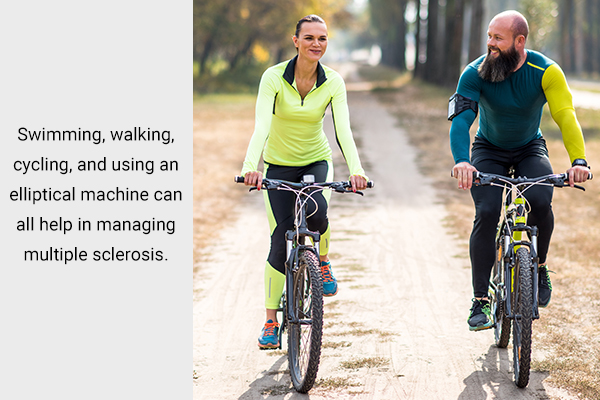
There is no one-size-fits-all exercise routine for people with multiple sclerosis, but some general guidelines can help you get started.
Before beginning any new exercise program, it’s important to check with your doctor or multiple sclerosis specialist to make sure it’s safe for you. Once you have the green light, start slowly and build up gradually.
Aerobic exercise is a good choice for people with multiple sclerosis, as it can help improve cardiovascular fitness, reduce fatigue, and promote overall well-being. Swimming, walking, cycling, and using an elliptical machine are all good options.
One study found memory improvements of over 50% among multiple sclerosis patients who completed an aerobic exercise regimen. (11)
Strength training is also beneficial for people with multiple sclerosis. It can help improve muscle tone and bone density, reduce fatigue, and increase strength and endurance. (12) Use light weights and do multiple repetitions to start out. As you get stronger, you can increase the weight and number of reps.
The benefits of exercise for people with multiple sclerosis include reduced fatigue and improved strength, mobility, and most importantly bowel and bladder function. Moreover, exercise gives relief from constipation and urinary tract information.
4. Stress management
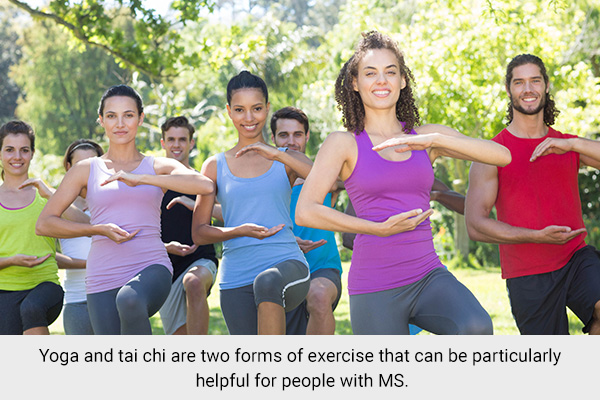
Yoga and tai chi are two forms of exercise that can be particularly helpful for people with multiple sclerosis. These mind-body practices can help improve balance, flexibility, and coordination while also reducing stress levels. (13)
Most-Asked Questions About Multiple Sclerosis
Is multiple sclerosis genetic?
Multiple sclerosis is an autoimmune disease with no known cause. It is not known whether people who develop multiple sclerosis have a genetic predisposition or not.
Can multiple sclerosis be cured?
Currently, there is no known cure for multiple sclerosis. However, with symptomatic management and regular checkups, quality of life can be maintained.
Does pregnancy worsen multiple sclerosis?
Multiple sclerosis is not worsened by pregnancy, although being very exhausted makes it difficult to carry on with pregnancy, especially if the condition is misdiagnosed. Mothers with multiple sclerosis frequently experience pregnancy falls and urinary tract infections. Infertility is not a side effect of multiple sclerosis.
Babies born to moms with multiple sclerosis are healthy and pose no particular risk, but as children become older, parents are taught how to regulate their children’s weight by regular exercise and eating more fruits and vegetables than junk food.
As with other conditions, smoking accelerates the progression of problems and raises the risk of cardiovascular disorders. (14)
Do hepatitis B vaccines cause multiple sclerosis?
No, receiving a hepatitis B vaccine does not result in multiple sclerosis.
Numerous studies have shown no link between the hepatitis B vaccination and multiple sclerosis. (15) Two examples of these studies are as follows:
- In a study undertaken in the United States, 422 participants with demyelinating diseases, including multiple sclerosis, and 921 matched controls were compared (people similar in age, gender, and enrollment in a healthcare system but who did not have demyelinating disease). The researchers found no association between hepatitis B immunization and demyelinating disease in the study population. (16)
- From 1994 to 2003, a research in France (Mikaeloff, 2007) compared kids with multiple sclerosis to kids without. The research found no connection between receiving a hepatitis B vaccine and developing childhood-onset multiple sclerosis. (17)
I think I have some symptoms of multiple sclerosis. When should I see a doctor?
If you think you are exhibiting any of the symptoms of multiple sclerosis, it is important to consult a doctor and neurologist right away. A timely diagnosis can help improve your physical symptoms and prevent further complications.
Which supplements can be used for multiple sclerosis?
After checking with your doctor, you can begin using Ginkgo biloba, turmeric, ginger, omega-3, and magnesium supplements to reduce the symptoms of multiple sclerosis.
What are the best workouts for people with multiple sclerosis?
Without a doubt, exercise plays a major role in ameliorating the symptoms of multiple sclerosis and improving quality of life. Swimming is an excellent exercise for people with multiple sclerosis as it takes the stress off the joints, is relatively safe (under supervision), and can boost mood.
Since there is no cure for multiple sclerosis, can I replace my allopathic medication with a home remedy?
Please do not discontinue any medication or modify any treatment plan without consulting a doctor first. While home remedies can be effective in managing symptoms, it is hard to know if the relief in symptoms is from the remedy itself or from a temporary remittance of the disease.
You can, however, continue to try home remedies concurrently with your allopathic treatment plan, after obtaining approval from your doctor.
Final Word
Although there is no cure for multiple sclerosis, there are many home remedies that can help relieve some of the symptoms. If you are suffering from multiple sclerosis, home remedies can help provide some relief.
Remember to always consult with your doctor before trying any new remedy, especially if you are taking medication for your condition.
 Continue ReadingMultiple Sclerosis: Causes, Symptoms, and Treatment
Continue ReadingMultiple Sclerosis: Causes, Symptoms, and Treatment
- Was this article helpful?
- YES, THANKS!NOT REALLY


